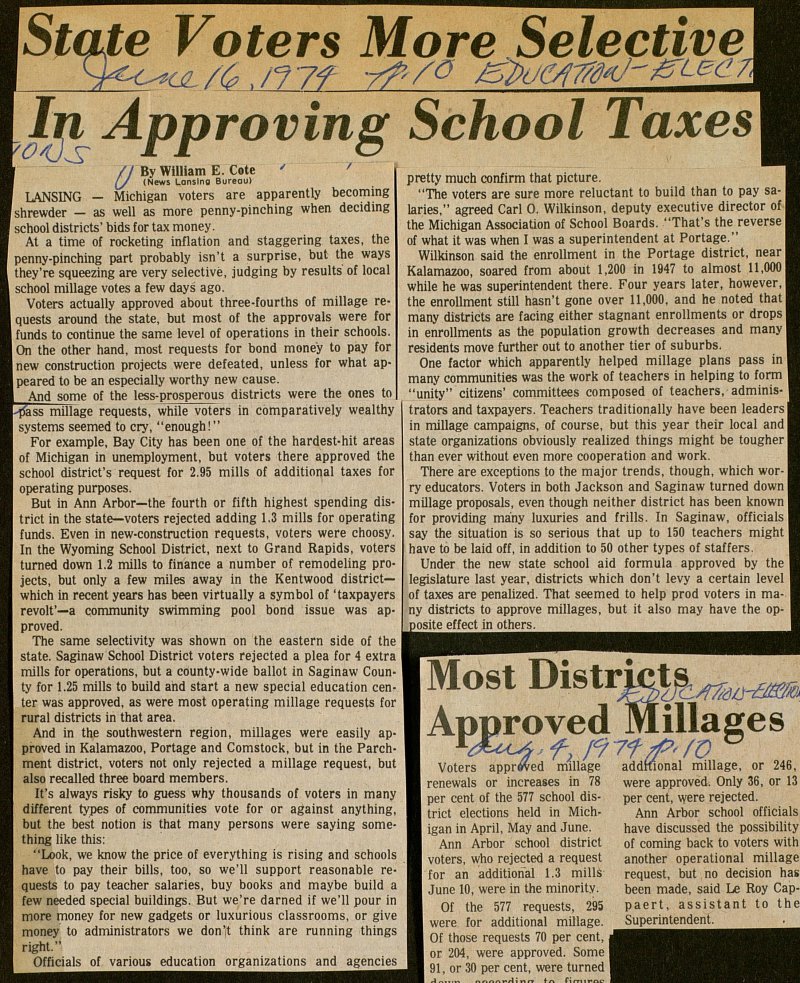State Voters More Selective In Approving School Taxes

I LANSING - Michigan voters are apparently becoming [shrewder - as well as more penny-pinching when deciding I school districts' bids for tax money. At a time of rocketing inflation and staggering taxes, the penny-pinching part probably isn't a surprise, but the ways they're squeezing are very selectivè, judging by results' of local I school millage votes a few days ago. I Voters actually approved about three-fourths of millage reI quests around the state, but most of the approvals were for I funds to continue the same level of operations in their schools. I On the other hand, most requests for bond money to pay for I new construction projects were defeated, unless for what apI peared to be an especially worthy new cause. I And some of the less-prosperous districts were the ones to Ia ss millage requests, while voters in cómparatively wealthy I systems seemed to cry, "enough!" For example, Bay City has been one of the hardest-hit areas I of Michigan in unemployment, but voters there approved the I school district's request for 2.95 milis of additional taxes for I operating purposes. But in Ann Arbor- the fourth or fifth highest spending disI trict in the state- voters rejected adding 1.3 milis for operating I funds. Even in new-construction requests, voters were choosy. I In the Wyoming School District, next to Grand Rapids, voters I turned down 1.2 milis to finance a number of remodeling proI jects, but only a few miles away in the Kentwood district - I which in recent years has been virtually a symbol of 'taxpayers I revolt'- a community swimming pool bond issue was apI proved. The same selectivity was shown on the eastern side of the I state. Saginaw School District voters rejected a plea for 4 extra I milis for operations, but a county-wide ballot in Saginaw CounI ty for 1.25 milis to build and start a new special education eenI ter was approved, as were most operating millage requests for I rural districts in that area. And in the southwestern región, millages were easily apI proved in Kalamazoo, Portage and Comstock, but in the ParenI ment district, voters not only rejected a millage request, but I also recalled three board members. ■ It's always risky to guess why thousands of voters in many I different types of communities vote for or against anything, I but the best notion is that many persons were saying someI thing like this: "Look, we know the price of everything is rising and schools I have to pay their bilis, too, so we'll support reasonable reI quests to pay teacher salaries, buy books and maybe build a I few needed special buildings. But we're darned if we'll pour in I more money for new gadgets or luxurious classrooms, or give I money to administrators we dontt think are running things I right." Officials of various education organizations and agencies "I pretty much confirm that picture. "The voters are sure more reluctant to build than to pay 1 laries," agreed Cari O. Wilkinson, deputy executive director of I the Michigan Association oí School Boards. "That's the reverse I of what it was when I was a superintendent at Portage." Wilkinson said the enrollment in the Portage district, near I Kalamazoo, soared from about 1,200 in 1947 to almost 11,000 1 while he was superintendent there. Four years later, however, I the enrollment still hasn't gone over 11,000, and he noted thatl many districts are facing either stagnant enrollments or drops I in enrollments as the population growth decreases and manyl residents move further out to another tier of suburbs. One factor which apparently helped millage plans pass in I many communities was the work of teachers in helping to form I "unity" citizens' committees composed of teachers, 1 trators and taxpayers. Teachers tradition.ally have been leaders! in millage campaigns, of course, but this year their local andl state organizations obviously realized things might be tougher I than ever without even more cooperation and work. There are exceptions to the major trends, though, which 1 ry educators. Voters in both Jackson and Saginaw turned down I millage proposals, even though neither district has been known I for providing many luxuries and frills. In Saginaw, officials I say the situation is so serious that up to 150 teachers might I have to be laid off, in addition to 50 other types of staffers. Under the new state school aid formula approved by the I legislature last year, districts which don't levy a certain level I of taxes are penalized. That seemed to help prod voters in many districts to approve millages, but it also may have the opposite effect in others.